Best Bitcoin Credit Cards of 2023
Crypto credit cards (sometimes called bitcoin credit cards) are the next generation of credit cards. The post Best Bitcoin Credit Cards of 2023 appeared first on Bitcoin Market Journal.

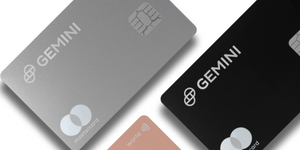
Gemini Crypto Credit Card
Gemini is not just a leading cryptocurrency exchange; they also offer a crypto credit card.
Read our review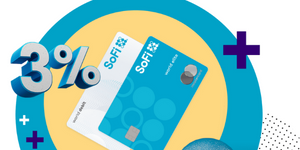
SoFi Credit Card
SoFi is a US-based financial services company that offers personal loans, mortgages and other banking services; it’s teamed up with Mastercard to offer cryptocurrency credit cards.
Read our review
Upgrade Bitcoin Rewards Card
Upgrade’s offering is a bitcoin credit card that allows you to earn bitcoin rewards when making purchases.
Read our review
Venmo Credit Card
Venmo is a mobile payment service that provides everyone a means to send, receive, and store their money.
Read our review
Crypto credit cards (sometimes called bitcoin credit cards) are the next generation of credit cards. They look like a typical credit card and act like a typical credit card: you can generally use them anywhere Visa, Mastercard, or Amex are accepted.
(Don’t confuse crypto credit cards with crypto debit cards, which are more like a prepaid card. See our list of best crypto debit cards here.)
Typically crypto credit cards are issued by banks or financial institutions, who give you a credit line. Alternatively, you may have your credit limit linked to your cryptocurrency balance.
There are various benefits of crypto credit cards, including:
- Earning rewards in cryptocurrency (like cashback rewards, but in crypto)
- The ease of making purchases directly with crypto
- Withdrawing cash from an ATM without converting it back into fiat currency first
However, while these cards have benefits, smart investors must remember to spend responsibly, beware of tax obligations, and pay the balance off every month to avoid excessive interest fees.
Bitcoin Credit Cards Compared
We’ve rated and reviewed the best crypto credit cards on the market; read on for our top picks.
| Card | Fees | Crypto Supported | Crypto Rewards? | Availability |
| Gemini Crypto Credit Card | No annual fees. APR: 17.24% – 29.24% variable APR. $10 or 3% for cash advances (whichever is greater). No ATM withdrawal fees. | Offers rewards in bitcoin, Ethereum and 60+ other cryptocurrencies (Full list). | Yes: 3% crypto rewards for dining (up to $6k annually then 1%), 2% for groceries, and 1% for other purchases | United States residents. Cardholders can spend with the Gemini card in outlets around the world accepting Mastercard |
| SoFi Credit Card | No annual fees. APR: 17.24% – 29.24% for purchases and balance transfers. 31.24% for cash advances. Balance transfer and advance fees attract a $10 or 5% fee, depending which is greater. Late payment and returned payments up to $39. | Bitcoin and Ethereum. | Yes: 3% for the first year if you have direct deposit to a SoFi bank account. 2% afterwards. Additional $250 bonus for new customers who open an online bank account and receive deposits. | Can be used around the world wherever Mastercard is accepted |
| Upgrade Bitcoin Rewards Card | APR: 14.99% – 29.99%. No annual fees. 1.5% fee for selling Bitcoins. | Bitcoin | Yes: 1.5% Bitcoin on purchases when the statement is paid. Up to 10% cashback with Upgrade Shopping powered by Dosh. | Upgrade Bitcoin Rewards Card is not currently available in Hawaii, Iowa, Louisiana, Nevada, New Hampshire, North Carolina, West Virginia, Wisconsin, and the Disctrict of Columbia. |
| Venmo | APR: 15.24% to 24.24%. No annual fees. No foreign transaction fees. 10$ or 5% on cash advances (whichever is greater). 3% standard fee when used to make person-to-person payments | Bitcoin, Ethereum, Bitcoin Cash, and Litecoin | Yes: Automatically earn 3% and 2% cashback on your top and second spend categories, respectively. Earn 1% cashback on all eligible purchases. | Can be used anywhere worldwide where Visa credit cards are accepted |
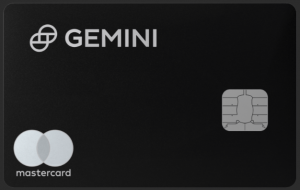 Gemini Crypto Credit Card
Gemini Crypto Credit Card
Gemini is not just a leading cryptocurrency exchange; they also offer a crypto credit card.
The company lets you spend your digital currency anywhere in the world just as you would with any other credit or debit card. The exchange provides over 50 types of cryptocurrencies; account holders get their rewards immediately.
The card does not charge any extra fees for purchases or ATM withdrawals and offers other features like 24/7 customer support and fraud protection.
Fees: No annual fees. 17.24% – 29.24% variable APR. $10 or 3% (whichever is greater) for cash advances. No ATM withdrawal fees.
Cryptos Supported: Offers rewards in bitcoin and 60+ other currencies. (Full list here.)
Rewards: 3% crypto rewards for dining (up to $6k annually, then 1%), 2% for groceries, and 1% for everyday purchases.
Availability: United States residents only. Cardholders can use the Gemini card anywhere in the world that accepts Mastercard.
Pros:
- Cryptocurrency awards converted in real-time.
- Cashback on dining, groceries, and other purchases.
- No annual or exchange fees.
Cons: High ATM withdrawal fees.
Conclusion: The Gemini credit card is good for United States residents who dine out regularly, want to earn rewards in real-time and earn cashback for everyday spending.
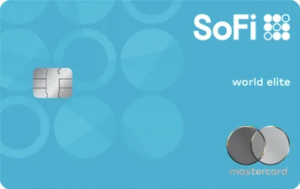 SoFi Credit Card
SoFi Credit Card
SoFi is a US-based financial services company that offers personal loans, mortgages and other banking services; it’s teamed up with Mastercard to offer cryptocurrency credit cards.
Sofi’s credit card comes with multiple benefits, including cashback for spending with high-profile brands like Lyft and DoorDash, and Mastercard ID theft protection.
Along with the 2% cashback, SoFi gives customers two reward points on every dollar spent when making eligible purchases.
Fees: No annual fees. Balance transfer and advance fees attract a $10 or 5% fee, whichever is greater. Late payment and returned payment fees cost up to $39.
Cryptos supported: bitcoin and Ethereum.
Rewards: 1% if used against your SoFi credit card account; 2% when paying off qualifying debt, saving or investing with SoFi.
Availability: You can use the SoFi crypto credit card wherever Mastercard is accepted.
Pros:
- No foreign transaction fees
- Users who pay 12 minimum monthly credit card payments on time qualify for an APR reduction of 1%.
- Unlimited cashback.
Cons:
To get the full 2%, card holders must use their rewards to pay down loans or redeem as cash back to a qualifying SoFi account. If you use rewards to pay off credit card debt, your crypto rewards falls to 1%.
Higher transfer fees and cash advance fees than some competitors. Cash balance transfer fees are $10 or 5%, while cash advance fees are 3-5% or $10, whichever is higher.
Conclusion: SoFi looks like a great deal, but as usual it’s wise to look at the small print. To get the highest level of rewards, cardholders must hold a qualifying account, offering less value. On the plus side, SoFi does offer some great additional bonuses like MasterCard anti-fraud protection.
 Upgrade Bitcoin Rewards Card
Upgrade Bitcoin Rewards Card
Upgrade’s offering is a bitcoin credit card that allows you to earn bitcoin rewards when making purchases.
You can pay down your balance in equal monthly payments in return for a fixed interest fee, making it easier to budget.
Another advantage of the Visa card is the ability to use it to access a personal loan that gets paid directly to your account.
Once you’ve earned your bitcoin rewards, you can let the balance grow and the NYDIG platform stores your coins. When you sell the bitcoin, they’re then applied as statement credit.
Your bitcoin rewards are subject to a 90-day holding period.
Fees: None, except bitcoin fees of 1.5% when you sell.
Cryptos supported: Bitcoin
Rewards: Unlimited 1.5% cashback. Other benefits include baggage insurance, purchase protection, and extended warranty coverage.
Availability: Not available in Hawaii and North Carolina.
Pros:
- Lower monthly payments and no annual fees.
- Flexibility. Users can spend their crypto at any merchant that accepts Visa, or transfer funds to their bank account.
- Fixed rate monthly payments.
Cons:
- You can use the card to buy from retailers and ecommerce stores, but not for withdrawing cash from ATMs.
- 1.5% fee applies if you sell your bitcoin rewards.
- Bitcoin rewards are stored on the NYDIG platform with no choice to transfer them to your crypto wallet.
- There is a 90-day holding period after your first Bitcoin sale for redemption.
Conclusion: Although the rewards could be more generous, the bitcoin reward credit card serves as an introduction to cryptocurrencies and their associated volatilities. It also wins points for not having any fees, other than bitcoin sales fees and the usual APR. However, the limitations on how cardholders can use the crypto rewards may seem too restrictive for some.
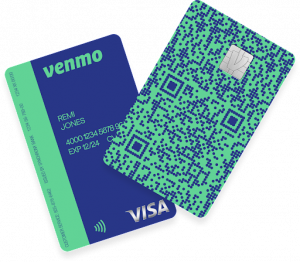 Venmo Credit Card
Venmo Credit Card
Venmo is a mobile payment service that provides everyone a means to send, receive, and store their money.
The peer-to-peer payment platform has partnered with Visa for the Venmo Credit Card. It works like a traditional cashback card, except you can convert your “Cash Back to Crypto,” meaning they will buy crypto on your behalf, which you can hold or sell anytime.
The Venmo card is printed with a personal Venmo QR code on the front that takes friends and businesses straight to your Venmo profile when scanned and activated.
Notifications will also be sent straight to your phone and email when transactions are completed, providing an easy way to keep tabs on your card activity.
Fees: 3% standard fees when used to make person-to-person payments. A cash advance fee of $10 or 5% of each cash advance amount, whichever is greater, also applies.
Cryptos supported: Bitcoin, Ethereum, Bitcoin Cash, and Litecoin
Rewards: The Venmo Credit Card has three tiers of cashback rewards depending on eligibility:
- 3% cashback on the top spend category
- 2% cashback on the second top spend category
- 1% on other eligible purchases
The card calculates your top spend categories each statement period and subsequently applies the reward rates. And remember, all cashback rewards can be converted to crypto.
Availability: Can be used anywhere worldwide where Visa credit cards are accepted.
Pros:
- Competitive cash back rewards
- No annual fees or foreign transaction fees
- Printed QR code to connect directly to Venmo Account
Cons:
- No low intro APR
- Currently limited to select Venmo account holders
Conclusion: As Venmo is becoming ubiquitous for paying friends and family, a Venmo credit card could make sense — especially if all those cashback rewards can be converted to crypto.
Remember: Pay Off in Full, Every Month
From a crypto investor standpoint, crypto credit cards offer a huge benefit: they let you keep earning crypto while making everyday purchases. It’s another form of steady-drip investing.
But this only makes sense if you are paying off your credit cards in full, every month. Otherwise, the exorbitant interest rates will eat up any possible gains you could make on your crypto investments.
Credit cards are a tool to make payments easier, but don’t let them drag you into debt. It’s far better to cut up the cards and pay cash, rather than using cards to buy crypto on credit.
Tips on Using Bitcoin Credit Cards
At Bitcoin Market Journal, we’re all about helping you make smart financial decisions using crypto. This goes double with bitcoin credit cards, which come with their own set of cautions.
Read the Fine Print
Problem: Crypto cards have complicated fee structures and lack of consistency between cards. This is because the “bridge” between digital and traditional payment systems (e.g., VISA and crypto) is still being built.
Solution: Do your homework. Some of these cards don’t have the same perks as traditional credit cards. They also have higher annual fees. As sexy as it sounds to earn bitcoin rewards, you may still be better off with a traditional credit card (once a year, you can still use your cashback rewards to buy bitcoin).
Make Sure It’s Really a Credit Card
Problem: Although many companies label their products as “crypto credit cards,” they don’t work the same way as traditional credit cards. Many are really crypto debit cards, where you’re taking funding from the crypto in your account rather than establishing a credit line.
Solution: Credit card companies should be clear about what is a “crypto credit card” and a “crypto debit card,” and educate investors on the pros and cons of each (as we’re doing here).
Be Sure It’s Available in Your Country
Problem: Because this industry is new, most cards are only available in certain jurisdictions, and all cards have conversion fees if you want to use them internationally. These international fees can be confusing; sometimes it’s cheaper to just pay cash.
Solution: Bitcoin credit card apps and websites should auto-detect your country and just give you clear language on where it can be used and the fees to use it internationally.
Beware of Processing Delays
Problem: Consumers are used to credit cards making instant transactions, but crypto doesn’t work that way. A single crypto transaction can vary from a few minutes to over an hour, or even a few days.
Solution: Bitcoin credit card apps should include clear communication on the transfer process and a constantly-updated “tracking number” (like FedEx tracking) that shows what’s happening.
Beware of Volatility and Fees
Problem: If you’re holding your native assets in crypto, understand that it can swing wildly in price from day to day. (Warning: some “bitcoin credit card” providers convert you into a native token, which means now you have volatility and a different token.)
Solution: Bitcoin credit cards should have an easy three-swipe “tutorial” that walks you through how digital assets work, clarifying how your holdings may change over time.
Pros and Cons of Bitcoin Credit Cards
| Pros | Cons |
| You can use them worldwide in outlets that accept Visa and Mastercard. However, depending on the card type, some geographical restrictions may apply. | Some have limited options for spending your coins. |
| Risk-free access for cardholders new to crypto. | High conversion fees are associated with some cards. |
| Ability to hold both fiat and cryptocurrencies. | Geographical limitations may apply. |
| Crypto cashback rewards and flexible spending. | The volatility of cryptocurrencies means any cashback may lose its value. |
Crypto Credit Cards vs. Crypto Debit Cards
A crypto credit card allows you to buy things and pay for them later. A crypto debit card must be loaded up with value first (either cash or crypto).
Crypto debit cards come in two flavors:
- Prepaid, where you add crypto to your card, which then gets converted into fiat currency for spending.
- Connected to your crypto account, and your cryptocurrencies are converted to fiat when you spend them.
See our guide to Best Crypto Debit Cards for more.
How We Choose the Best Crypto Credit Cards
Here are some key factors our editors consider when choosing this list of crypto credit cards:
Card Issuer
We look for reputable card issuers with a history of providing reliable financial services to consumers. Most crypto credit cards are co-branded Mastercard or Visa cards, so we look at the sponsoring company as well.
Reward Rate
Your reward rate is how much you’ll get in crypto for each purchase. Sometimes the reward rate may be conditional (based on purchase category or account qualification, for example).
We look for good reward rates across the board, without luring you into spending more in categories you may not really need (e.g., dining out).
Fees
Any fees eat into your crypto investments, so we also look at total fees including:
- Membership fees: Monthly or annual membership fees are usually the big one, and these add up over time.
- Foreign transaction fees: For card withdrawals outside of the U.S., these can add up for frequent travelers (usually 3% to 5%).
- ATM withdrawal fees: These can vary from $2.50 to $3, sometimes more.
Investor Summary
For most investors, the best deal is a credit card that allows you to pay off your monthly balance in dollars, while giving you cashback rewards denominated in bitcoin.
In this way, you get the best of both worlds: it behaves like a regular credit card, but with the added bonus of earning crypto, which has delivered eye-popping returns over the last decade.
For more crypto tips, don’t forget to sign up for our free blockchain investing newsletter.
The post Best Bitcoin Credit Cards of 2023 appeared first on Bitcoin Market Journal.







